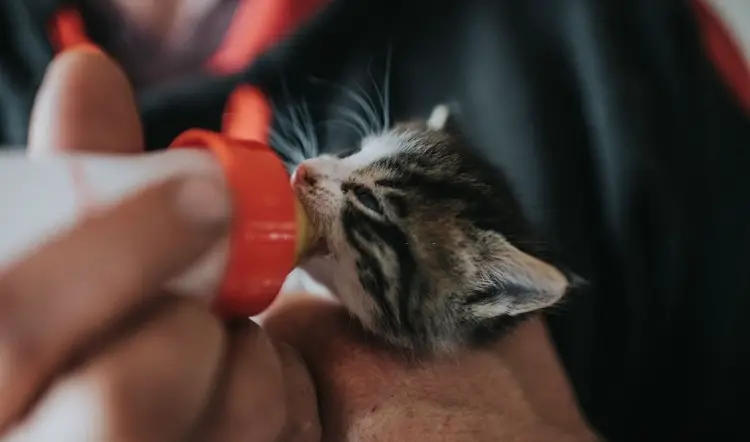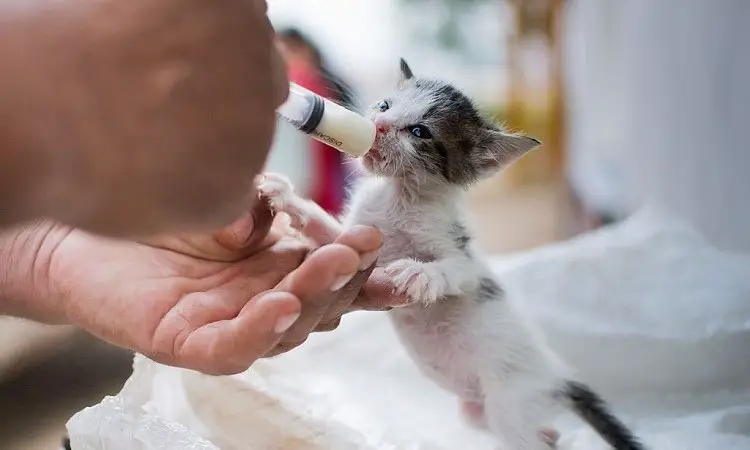Nothing depresses a cat parent more than the inability of their cat to feed its litter after birth. You know, nothing can be compared to the natural nutrients gotten from the mother’s milk.
The good news is; you don’t have to worry anymore about your kittens even if their mother is unable to feed them. You also do not have to worry if you can’t afford the formula your kittens need to grow.
In this article, we’ll educate you on what to feed a baby kitten if there is no formula. Read on and find out how to do the magic!
What is a Kitten Milk Replacer?
Before we go on to discuss alternatives to a formula for baby kittens, we will first like to tell you what a Kitten Milk Replacer is all about.
In simple words, a Kitten Milk Replacer is kitten food that is made for kittens that cannot have their mother’s milk or formula.
It is made to closely match the natural milk of the mother. KMRs contain carbohydrates, fat, and proteins. They also contain essential vitamins and minerals and come in both powdered and liquid forms.
KMRs are suitable for kittens that are six weeks old and younger. So, you don’t have to worry about them being inappropriate for your very tender kittens. You can get the best kitten milk replacer for your kitten here.
What to Feed a Baby Kitten If There is No Formula
There are a lot of DIYs that you can employ to feed your baby kitten if there’s no formula. Thankfully, the ingredients needed for these DIYs can be gotten easily from shops.
We’ll share some amazing baby kitten DIY food. These foods were developed by the Cornell School of Veterinary Medicine. Find them below!
Recipe 1
What you’ll need
- 1-quart whole goat’s milk
- Light Karo syrup
- Non-fat plain yogurt
- Egg yolk
- Unflavored gelatin
In this recipe, all you have to do is put the goat’s milk in a saucepan while adding the right amount of gelatin-based on the kitten’s age.
Then heat the mixture until the gelatin has dissolved well, then turn off the heat. Add the other ingredients and refrigerate.
Mind you, there are fixed amounts for this recipe to achieve better results. You can find a guide on how to get the right proportions at Cornell School of Veterinary Medicine.
Recipe 2
What you’ll need
- 8 ounces Homogenated whole milk
- 2 egg yolks
- Salad oil
- 1 drop liquid pediatric vitamins (optional)
This recipe is quite easy. All you need to do is mix these ingredients in the required proportions. Keep it refrigerated.
Recipe 3
What you’ll need
- Evaporated milk
- Egg yolk
- Corn syrup
All you need to do is mix the ingredients well and store them in a tightly sealed jar in the refrigerator.
During mealtime, mix half of the estimated feed with an equal amount of boiling water. Each day, mix a drop of the human infant liquid vitamins in each kitten’s formula portion.
Recipe 4
What you’ll need
- 1 part boiled water to 5 parts evaporated milk
- Half teaspoon bone meal per 16 ounces fluid
All you need to do is mix everything up, stir as usual and refrigerate. This helps them last and stay fresh for a longer time.
How to Feed a Newborn Kitten

If you decide to bottle feed your kitten, there are special baby bottles meant for it. You can buy these tiny baby bottles with tiny nipples for kittens online or in any pet store.
These bottles can contain a small quantity of formula so you don’t have to worry because they are easy to handle while also holding a small kitten.
If you can’t find any of these bottles online, you can employ the method of using a syringe without the needle, especially if the kitten won’t take the bottle readily. You can get oral syringes in any nearby pharmacy and use them for this purpose.
To do this, simply heat your homemade formula or the formula you bought at the store until it is warm and test a few drops of milk on your wrist first.
While you do this, you’ll either feel it a bit warm or even cool, not too warm or hot. Try not to use the microwave to heat the microwave.
Some people also employ the method of putting the formula in the bottle or syringe and then placing the bottle or syringe into a bowl containing hot water to heat the formula.
Once you notice the formula temperature is perfect on your skin, you can introduce it to your kitten.
Remember, to keep your kitten in a natural feeding position on its belly while offering warm formula every 3-4 hours until the kitten begins to wean to solid food.
Keep in mind, kittens should be fed about eight milliliters of formula per ounce of body weight a day.
This means that if your kitten weighs four ounces, you should feed them about 32 milliliters of formula total in a day, so you can give the kitten about eight milliliters of formula every four hours.
If your kitten is going through constipation, just add one drop of vegetable oil to each kitten’s formula no more than once daily until the constipation is relieved.
How Many Times Should I Feed My Baby Kitten in a Day?
This is one very important question that most owners ask. We are not going to leave it unanswered.
But before we proceed, we would love you to know that many things come without rules. Feeding baby kittens is one of those things.
What works for you and makes you happy could cause someone else immense misery. You know, no two pets are alike in every way.
On average, most kittens eat every two to three hours. This happens especially in the first four weeks of their lives.
By the time kittens get to four weeks and above, they begin to eat less frequently (say every four hours).
The older cats grow, the less frequent their feeding becomes. Matured cats for go for up to six hours without food.
Tips to Keep Your Baby Kittens Healthier While Feeding
Baby kittens are usually very sensitive. The littlest thing you neglect could put them in jeopardy. You have to be meticulous with their feeding and all the processes involved in it.
We know you love your pet a lot and wouldn’t want any tragic thing to happen to it. So, here are tips we’ve curated for the better health of your pet in regards to its hygiene.
1. Keep It Clean
Keep all the items you use in feeding the pet clean, from the feeding bottles to the bowls.
Also, we advise that you wash them and store them properly after every use.
Keeping them dirty for too long not only reduces their longevity but also aids the growth of microorganisms because these bottles thrive in dirty and moist places.
2. Don’t Skip Processes
This is one thing that quite a lot of cat owners are guilty of. Some of them try to quicken things by skipping important processes in their pet care.
For example, if a particular thing demands that you use warm water to kill germs. Do not try to ditch the process by using cold water because you don’t want to get hot water.
You might consider it as a small thing, but not your cat. You might even end endangering it.
3. Space
Space is an essential factor in the hygiene and proper growth of your baby kittens. Do not keep too many of them in one space. Each of them needs their own space to explore and get in tune with the environment.
Read Also: How To Keep Cat Out Of a Crib
Other Frequently Asked Questions
Can You Feed Kitten Cow Milk In An Emergency?
No! Kittens should only be fed with mother’s milk, or a kitten milk replacer, commonly known as KMR or kitten milk formula.
As you may know, kittens lack the enzymes needed to break down the lactose in cow milk. Hence, introducing cow milk to your kittens can result in diarrhea and dehydration in newborn kittens.
Can I Give My Baby Kitten Regular Milk To Drink?
No, it is not advised to give cow’s milk to your kitten since it lacks the necessary nutrients.
Introducing cow’s milk to your kitten could result in diarrhea, a potentially fatal disease in newborn kittens.
You should always give the kitten formula that has been approved by the manufacturers. Homemade recipes are a great choice. You can also use Kitten Milk Replacer.
Can I Give Kittens Water?
Water is essential for every living thing including cats and kittens to aid the proper functioning of their body system.
Staying hydrated aids digestion eliminates feces, and prevents crystals from developing in a cat’s pee. It also plays a huge role in keeping the tissues and joints moist.
Cats can derive a lot of their water needs from canned wet food, but you should always provide them access to lots of fresh, clean drinking water.
Many cats may dislike drinking water, particularly if the water is still or standing water.
Depriving your cat of water can result in dehydration, which can be deadly in a kitten that is already fragile. Always keep an eye on your cat’s water consumption.
Read Also: How To Keep Cat Out of Bassinet
Conclusion
We believe this article has answered your big question, what to feed a baby kitten if there is no formula.
Sometimes, not having formula or proper food for baby kittens can be very overwhelming. You might even begin to feel like you don’t do enough making you feel like a terrible pet parent.
You don’t have to feel so anymore. Whenever the feeling creeps in, remember all the recipes and alternatives we discussed in this article. Then you go make a wonderful meal for your cute baby kitten!
